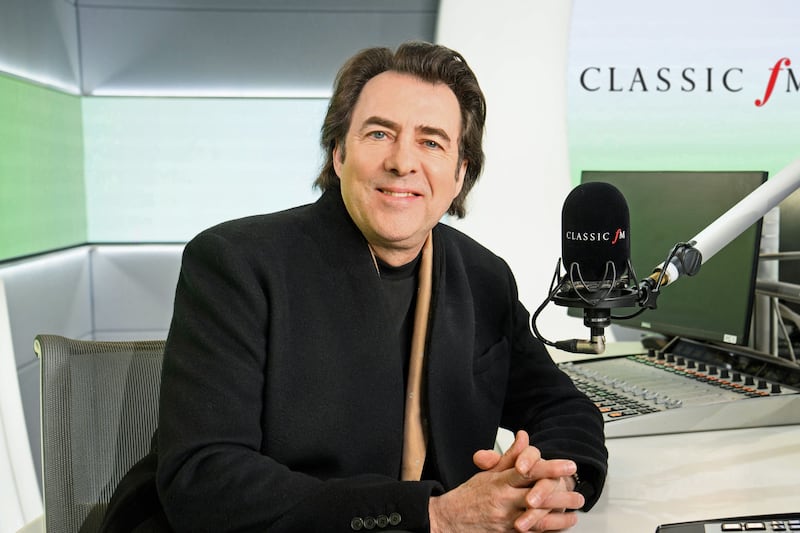As the father of four boys, Alexander Armstrong can’t overstate the value of reading to his family.
So much so, that the TV and radio presenter is now also a debut children’s book author, and is on a mission to get both children and their parents to love books as much as he and his sons do.
“There’s nothing better than parents reading books to children,” he declares. “Yet only one in three children reads books – we’ve somehow allowed ourselves to drift away from reading being right at the heart of childhood, and it’s a great shame.
“I suspect it’s as a result of technology and the fact that everybody has smartphones – I would say far too young. But as a consequence, children aren’t being introduced to the magic of reading and all the wonderful things it opens up in their lives.”
Armstrong, who presents the BBC game show Pointless as well as a weekday Classic FM show, had his first children’s book, Evenfall: The Golden Linnet, published last autumn. He’s also an ambassador for the Bookshop.org Read It Forward campaign, which aims to inspire a love of reading in the next generation.
He says he loved reading as a child – and still does – and is happy that his sons, now aged 10, 14, 15 and 17, enjoy reading too. “A really key part of their childhood was that we always read to them,” he says. “I tended to do it because I really loved it – I think one of the real pleasures of parenthood is reading to your children.
“It was a big part of our routine – it was what would get them up to bath time, a really useful carrot at the end of the stick.
“And they just loved a story. We read some wonderful books together, and that was where they learned what worlds they could open up that could be found in a book.”
Armstrong says he loves being described as a children’s author, and he’s currently writing book two of what he thinks will be a four-part series. “I find it’s a great de-stressor,” he admits. “Creativity is the antidote to anxiety – I’ve loved every stage of it.”
But how does he find the time to write, given his demanding Pointless filming commitments and his regular Classic FM shows – not to mention being a dad-of-four?
“I’ve learned to throw myself back into the book whenever I get a moment,” he explains. “If there’s a long piece of music on Classic FM – and some of them are long – I can just go back to the book and pick it up quite quickly. I’ve got very good at staying enough in the world of the book to be able to return to it without too much preliminary psyching up.
“I write a lot in lunch breaks, and I travel by train a lot, so I’m very good at writing on the train. I much prefer writing in decent long, uninterrupted, three to four hour stints, but that’s just not the shape of my days at the moment.”
Armstrong’s eldest three sons have, of course, read his book and “they really like it, which is great,” he says proudly.
But he points out: “When I started writing for children, I wonder if there was a little bit of me that imagined they would be a slightly more forgiving audience? If there ever was, it was mistaken.

“I would read passages to our boys to get their feedback, and they’d go to great lengths to try and be polite, but you could always tell if you’d overwritten something because their body language is very honest when you’re reading to them.
“You can tell when they’re gripped, and you can really tell when their attention is straying. So you have an audience that will only really want to read things that it loves, and it’s not going to bother with anything that’s not up to snuff. The children’s reading audience are not a forgiving audience.”
As a children’s author and father, Armstrong, 54, has a few ideas about how to get children to love reading as much as he and his boys do.
First of all, read to them when they’re young.
“That’s a relatively simple thing parents can do – not just simple, but really enjoyable. It’s a key part of introducing children to books,” he stresses.

It’s also important to choose the books you read to them carefully.
“To start with at least, you have to be quite selective with the books you recommend to them and make sure they’re ones they’ll really enjoy,” he suggests. “Nothing too heavy going to start with.”
And it can also be helpful to try and get it across to kids that books aren’t just something for school, he says.
“Make sure children really know what the pleasure of reading a book is. There’s always a danger that if it comes too much from teachers, it can feel like something they don’t want to take up. It’s that great problem of anything that’s recommended because it’s good for you – you instantly think ‘Urgh, I’m not going to do that’.
“So the best environment is in the home, and parents reading books to children, with good recommendations from credible sources they believe in, like a school friend, or if there’s a TikTok, as increasingly it’s becoming influential in what kids are reading.”
Armstrong also recommends taking children to a bookshop for an enjoyable day out.
“These days, when the high street seems to be dying, the great shop at the centre of communities is the independent bookshop, and never is that more important than with children. It’s where the magic happens.
“When I was little, it would always be a trip to our local independent bookshop after Christmas, and we’d spend an afternoon in there selecting books. It was one of those really exciting days. That’s where children fall in love with reading and the magic of the worlds that can be opened up to them.”
Another recommendation, he says, is for parents to think of books for children instead of just switching the TV on to keep them entertained.
“I suppose a lot of parents, perhaps understandably, will reach for the TV remote if they want a bit of peace, or they have to go off and do something and they want to occupy the kids, perhaps the TV is the first port of call,” he says. “But I would say a really good pile of books is another thing to consider.
“If for no other reason, the outcomes for children who enjoy reading are just so substantially better. All the data shows that children who read go on to do so much better in later life, not only to have better empathy, they have more developed imaginations, they do better at school, they make friends more easily.
“The list of benefits are so unarguable, it’s a no-brainer.”
Alexander Armstrong is an ambassador for the Bookshop.org Read It Forward initiative, which will donate 10% of every children’s book sale in February to children’s reading charities Book Trust and Scottish Book Trust, while also supporting independent bookshops.








